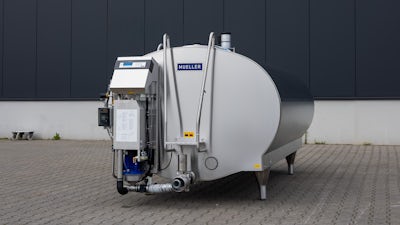Milk Cooler Preventative Maintenance
- Share on Facebook
- Share on LinkedIn
- Share on Email
-
Copy Link
-
Share Link
- Dairy Farm
- June 29, 2019
- 3 Minute Read
- Share on Facebook
- Share on LinkedIn
- Share on Email
-
Copy Link
-
Share Link

Introduction
Farmers and producers know that good milk quality depends on the correct cooling and system cleanliness.
As the milk cooling experts, Mueller® recommends our equipment owners, in conjunction with a knowledgeable service technician, develop a preventative maintenance schedule before using the equipment. To optimize operation, that plan should include cleaning and inspection schedules for all milk cooler components. The frequency of inspections will vary depending on the environmental conditions surrounding the installation and may be unique to each dairy. Here are some general guidelines to help you formulate that schedule and keep your milk-cooling equipment running excellently for decades to come:
Preventative Maintenance Guidelines
30-Day Intervals
- Evaluate, repair, and/or replace parts as needed*
- Confirm 115 °F (46.1 °C) minimum water temperature during the detergent wash cycle at the detergent drain
- Confirm 170 °F (76.7 °C) maximum wash water temperature at inlet**
- Confirm the correct pH of chemicals and PPM of chlorine
- Inspect the ladder for damage or wear
- Check milk temperature display accuracy
60-Day Intervals
- Evaluate, repair, and/or replace parts as needed*
- Confirm correct operation of condenser fan on air-cooled refrigeration units, and identify irregular noise which could indicate motor or fan blade failure
- Inspect condenser coils on air-cooled refrigeration units for excessive dirt accumulation and clean the condenser coils with approved copper/aluminum coil cleaner as required
- Visually inspect the internal walls of the milk cooler and other product contact surfaces for protein, fat, or mineral deposits. If surfaces are not clean, consult a knowledgeable service technician for necessary adjustments to the cleaning cycle, water supply, or chemicals used
90-Day Intervals
- Evaluate, repair, and/or replace parts as needed*
- Inspect rubber and rubber-like components (such as manway gaskets and outlet valve gaskets) for cracking, tearing, discoloration, loss of elasticity, or inking. Replace as needed
- Check agitator drives for noise, leakage, and correct clockwise rotation
- Check agitator mounting hardware, ensuring all bolts are tight and secure
- Check water solenoid fill screens for contamination or restriction
Annually
- Evaluate, repair, and/or replace parts as needed*
- Perform refrigeration system cooling performance survey*
- Perform wash system performance survey*
Mueller is dedicated to protecting your product and your bottom line. With the help of authorized Mueller parts and specialists, you can keep your operations running strong today and for generations to come.
* All inspection, repair, and service of electrical and refrigeration components should be performed by a Mueller Authorized Dairy Farm Equipment Dealer using Mueller trained and certified service technicians.
** Any equipment problem that could result from exceeding this limit will be considered outside the scope of the Mueller warranty and the sole reasonability of the owner.
More from Mueller Academy
- Dealer Insights from Cornes AG
- Why Direct Load Milk Is on Its Way Out
- The European Union F-Gas Regulations & Their Impact on the Refrigeration Industry
- What is the HiPerForm® Refrigeration System?
- Introducing Our New Membrane-Based Water for Injection (WFI) Skids
- Manway Gasket Installation & Bushing Adjustment
- How to Decide Between a Horizontal & Vertical Milk Tank
- MES & PSG Feedwater Quality Requirements
- On-Site Tank Fabrication Under Deadline